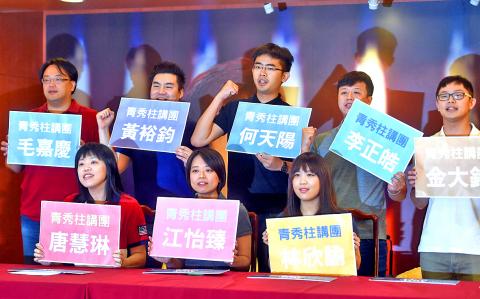Chinese Nationalist Party (KMT) presidential candidate Hung Hsiu-chu’s (洪秀柱) campaign office yesterday announced the organization of a small group of “young” people to defend and promote her campaign pledges on political talk shows.
Voices of young supporters of Hung have long been underestimated on such shows, the office said.
“These young defenders, who were born in the 1970s and the 1980s, aim to shatter the public’s traditional perception of how the KMT runs an election,” Hung campaign office spokesman Lee Chang-chi (李昶志) told a news conference in Taipei.

Photo: Fang Pin-chao, Taipei Times
Chanting “Chu [Hung] has young people’s backs and young people have hers,” the eight members of the group, clad in different colored shirts, told the news conference that the various colors signified the diversity of opinions of younger generations.
Hung spokesperson Hsu Chiao-hsin (徐巧芯) said that while the group’s members are young, they have experience in public affairs, are extremely eloquent and possess a unique perspective on current politics.
“They are to appear on political talk shows, preferably those deemed as leaning toward the pan-green camp, to advocate for the main principles of Hung’s campaign and to increase her recognition among voters,” Hsu said.
One of the eight, Mao Chia-ching (毛嘉慶) — who is deputy convener of the campaign office’s propaganda department — has a higher profile than the rest of the group because of his link to the recent “rain boots” scandal.
Political pundit Wang Shih-chi (王時齊) has said that Mao asked her to send a pair of name-brand rain boots to Democratic Progressive Party Chairperson Tsai Ing-wen (蔡英文) and to have Tsai photographed in them, in what Wang said was an apparent attempt to set-up the DPP’s presidential candidate.
“The silence of good people will only lead to the rise of the bad. Our society has been permeated with ill rumors that are spread and fabricated to intensify hatred and social divisions. I will not allow Taiwan to be torn like this,” Mao told yesterday’s news conference.
Another of the eight, Tang Hui-lin (唐慧琳), a research assistant at the KMT’s National Policy Foundation think tank, said the chaos caused by a media environment monopolized by political commentators was the main reason the group was formed.
“These so-called commentators spread worthless information every day to the public that is nothing but outright nonsense. We, the younger generation, can no longer stomach this phenomenon and have decided to step up,” Tang said.

CHANGING LANDSCAPE: Many of the part-time programs for educators were no longer needed, as many teachers obtain a graduate degree before joining the workforce, experts said Taiwanese universities this year canceled 86 programs, Ministry of Education data showed, with educators attributing the closures to the nation’s low birthrate as well as shifting trends. Fifty-three of the shuttered programs were part-time postgraduate degree programs, about 62 percent of the total, the most in the past five years, the data showed. National Taiwan Normal University (NTNU) discontinued the most part-time master’s programs, at 16: chemistry, life science, earth science, physics, fine arts, music, special education, health promotion and health education, educational psychology and counseling, education, design, Chinese as a second language, library and information sciences, mechatronics engineering, history, physical education

DEADLOCK: As the commission is unable to forum a quorum to review license renewal applications, the channel operators are not at fault and can air past their license date The National Communications Commission (NCC) yesterday said that the Public Television Service (PTS) and 36 other television and radio broadcasters could continue airing, despite the commission’s inability to meet a quorum to review their license renewal applications. The licenses of PTS and the other channels are set to expire between this month and June. The National Communications Commission Organization Act (國家通訊傳播委員會組織法) stipulates that the commission must meet the mandated quorum of four to hold a valid meeting. The seven-member commission currently has only three commissioners. “We have informed the channel operators of the progress we have made in reviewing their license renewal applications, and

The High Prosecutors’ Office yesterday withdrew an appeal against the acquittal of a former bank manager 22 years after his death, marking Taiwan’s first instance of prosecutors rendering posthumous justice to a wrongfully convicted defendant. Chu Ching-en (諸慶恩) — formerly a manager at the Taipei branch of BNP Paribas — was in 1999 accused by Weng Mao-chung (翁茂鍾), then-president of Chia Her Industrial Co, of forging a request for a fixed deposit of US$10 million by I-Hwa Industrial Co, a subsidiary of Chia Her, which was used as collateral. Chu was ruled not guilty in the first trial, but was found guilty

Taiwan People’s Party (TPP) Chairman Huang Kuo-chang (黃國昌) yesterday appealed to the authorities to release former Taipei mayor Ko Wen-je (柯文哲) from pretrial detention amid conflicting reports about his health. The TPP at a news conference on Thursday said that Ko should be released to a hospital for treatment, adding that he has blood in his urine and had spells of pain and nausea followed by vomiting over the past three months. Hsieh Yen-yau (謝炎堯), a retired professor of internal medicine and Ko’s former teacher, said that Ko’s symptoms aligned with gallstones, kidney inflammation and potentially dangerous heart conditions. Ko, charged with